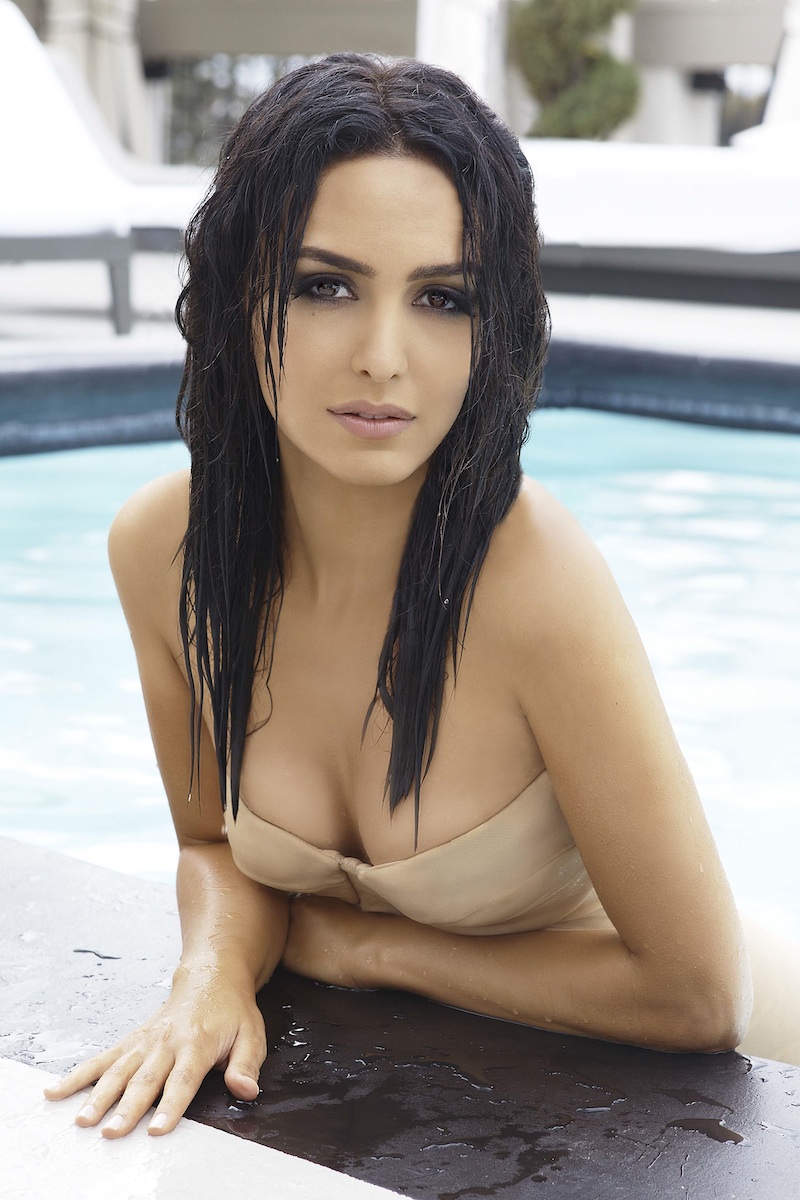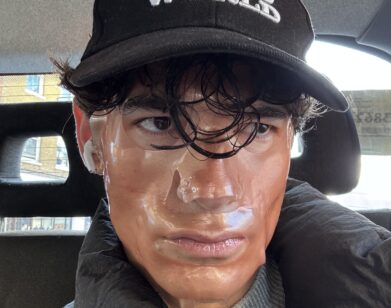Nazanin Boniadi’s Homeland Values
ABOVE: NAZANIN BONIADI.
We waited all summer for the new season of Homeland, and now that we’ve been able to sink our teeth into the first episode and grasp that the CIA is on the brink of being abrogated, there’s a surprise in store in the second episode. This Sunday, we are introduced to the dynamic character of Fara Sherazi, a Muslim woman who wears a hijab and works for the CIA. Fara is an expert in international banking whom Saul recruited her to uncover who funded the attack on the CIA. The creators and writers of Homeland are masters of shifting perception and allegiances, which begs the question: whose side is she really on? Sherazi is played by fresh face Nazanin Boniadi. Naz, as her family and friends call her, was born in Iran during the Iranian Revolution and is a dedicated human-rights activist for Amnesty International. We caught up with her in L.A. to discuss the complexities of playing Sherazi and what it’s like to be Saul’s new protégée.
KATIE FISCHER: In the third season of Homeland, you play Muslim CIA agent Fara Sherazi. How did you get into character? What type of research did you do?
NAZANIN BONIADI: Friends connected me with people who work in the national security arena and the State Department. It was important for me to make Fara as three-dimensional and honest as possible, so I wanted to understand the world and life to which she is exposed. I learned that these are folks tasked with almost impossible burdens and living under ever-shifting rules for personal and professional choices, while trying to keep a sense of balance and normalcy. It’s a very compartmentalized existence. I’m also a big fan of watching documentaries in preparation for a role. One that was particularly helpful for this role was The Gatekeepers, the story of Israel’s Shin Bet told by six former heads of the country’s secretive internal security service. I also discovered a couple of great organizations: MOST (Muslims on Screen and Television), which offers invaluable resources to the entertainment community in order to create more truthful and balanced depictions of Muslims. And the Muslim Public Affairs Council (MPAC) really helped me define what it means to be a Muslim American.
FISCHER: What type of relationship do you have with Carrie?
BONIADI: She mainly interacts with Saul at first. He is not only her boss but also her mentor. She reveres him in many ways. She interacts with Carrie more as the season progresses. Fara is a newbie and not nearly as accustomed as Carrie to the way the CIA operates. But the women share a similar passion for justice and aren’t afraid to question authority if they think something is wrong. The two characters couldn’t look or dress or sound more different, and yet there’s a great moment in a later episode where they are standing side by side working toward the same goal. It’s such a unifying image.
FISCHER: Did your being born during the Iranian revolution influence your role at all? If so, how?
BONIADI: Yes, I think it did. I was born in Tehran at a time when women’s rights were deteriorating at a rampant rate. My parents didn’t want to raise their daughter in a social, political, and religious climate that was growing increasingly oppressive toward women and girls, so they emigrated to London. But the struggle of the Iranian people was permanently etched in my social consciousness from a young age. So I fully relate to Fara’s desire for justice. When you or your loved ones escape repression, you often find yourself committed to ensuring that freedom prevails.
FISCHER: How are you similar to your character? How do you two differ?
BONIADI: We are both strong-willed with a deep sense of responsibility and a passion for justice. But I’d say I’m definitely goofier than Fara.
FISCHER: You’ve done a lot of work with Amnesty International, and you recently wrote an op-ed with for the Huffington Post questioning whether or not Iran’s reforms are meaningful. Does your activism work on human rights and women’s rights influence the roles you choose to play? If so, how?
BONIADI: Generally, I love being part of a project that imparts a positive message, is somehow educational or enlightening, helps to bridge differences, or inspires viewers in some way. I believe a lot of artists become activists because we rely on and value the freedom of expression and so we want to protect it. I think a culture can really be elevated through the arts, and it’s always a dream come true when I come across roles that enable me to fuse my love of storytelling with my passion for activism and raising social awareness.
FISCHER: What prejudices do you hope your performance dispels about Muslim women, if any?
BONIADI: How often do we see a hijab-wearing, career-driven, intelligent, independent Muslim woman on television with a voice of her own? It’s a groundbreaking role that I’m honored to play, but if anyone is dispelling prejudices, it’s the writers and producers who have created a role that shatters long-held stereotypes. Homeland is great at challenging our preconceived ideas. For example, most of us wouldn’t expect an all-American war hero like Nicholas Brody to sympathize with the enemy, and he definitely doesn’t look like the stereotypical Muslim. Similarly, many viewers will make up their minds about Fara the moment they set sight on her and hear her speak. She wears a headscarf and has a slight Iranian accent. She looks and feels completely out of place the moment she arrives at the CIA. She definitely senses that people define her by her appearance. The question is, has she become what society has imbued her with or does she prove them wrong? It will be interesting to see how audiences react to her.
FISCHER: Can you give us any hints about your character this season?
BONIADI: America and Iran have a complicated political history, and yet Fara is equal parts Iranian and American. Her biggest challenge is reconciling the two parts of her identity, while staying true to her oath to “support and defend the Constitution of the United States against all enemies, foreign and domestic.” The writers really do an outstanding job of making the characters multifaceted, and this one’s no exception.
FISCHER: What characteristics most define your character Fara? How does her experience as a banking analyst lead her to work for the CIA?
BONIADI: Fara is an intelligent, hard-working Muslim, Iranian-American analyst who moved to the US with her father in her teens. She is at the forefront of international finance, despite her young age, and she has a pure, idealistic view of justice. Saul recruits Fara to use her expertise in international banking to find out who funded the attack on the CIA at the end of season two. She’s basically responsible for tracing the funds to the bad guys. She is morally driven to do what’s right, and she thinks the CIA is the perfect place for that. World events weigh heavily on her conscience. She feels her religious identity has been hijacked by fundamentalists and terrorists, and she’s determined to reclaim it by ensuring that justice is served.
FISCHER: Who are your role models?
BONIADI: I’m inspired by strong, courageous women. My mother is the definition of a self-sufficient, independent woman whom I have always looked up to. I also greatly admire incredible women like Aung San Suu Kyi, and human rights attorney Nasrin Sotoudeh, who was wrongfully imprisoned for 4 years in Iran, simply for giving a voice to the voiceless and defending the helpless. And I’m in awe of the young Pakistani student and activist, Malala Yousafzai, for her bravery and resilience in the face of brutal repression.
NAZANIN BONIADI APPEARS IN THE THIRD SEASON OF HOMELAND STARTING THIS SUNDAY AT 9 PM ON SHOWTIME.







